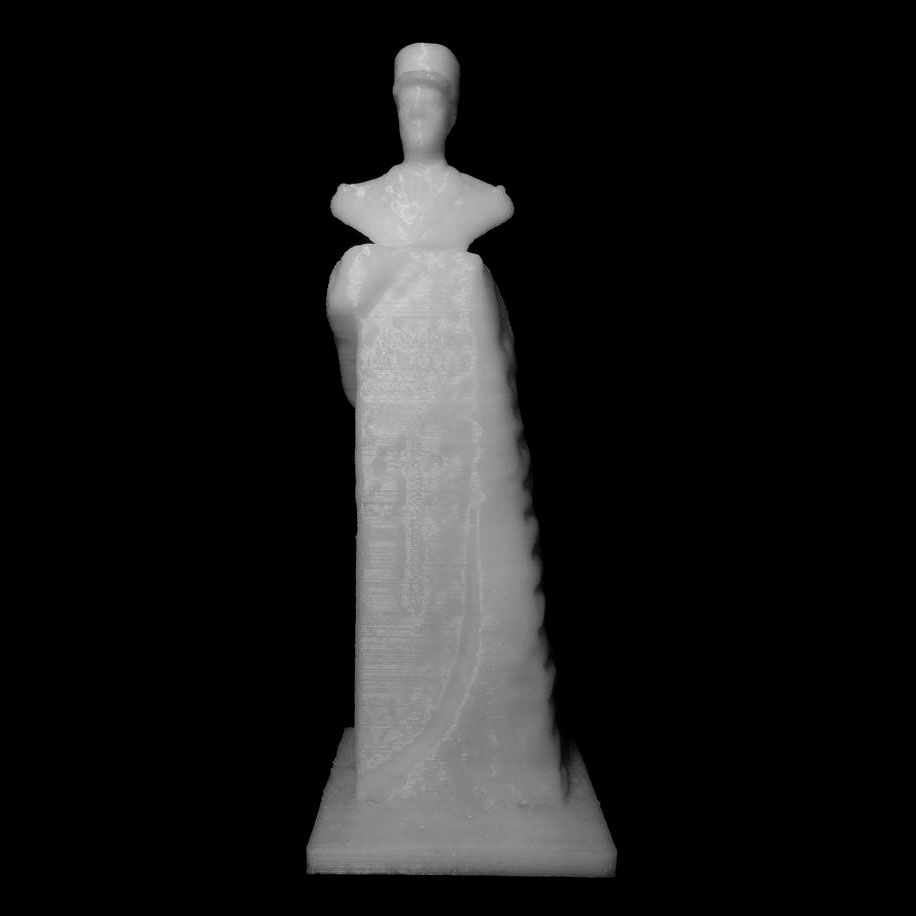
Charles de Gaulle in Valenciennes, France
myminifactory
Charles André Joseph Marie de Gaulle was a French general, writer, and statesman born on November 22, 1890. He became the leader of Free France from 1940 to 1944 and the head of the Provisional Government of the French Republic from 1944 to 1946. In 1958, he founded the Fifth Republic and was elected as its first president, a position he held until his resignation in 1969. De Gaulle graduated from Saint-Cyr in 1912 and served as a decorated officer during World War I, where he was wounded multiple times and taken prisoner at Verdun. He attempted to escape with a fellow prisoner but failed several times before being released after the war ended. During the interwar period, de Gaulle advocated for mobile armored divisions. At the start of World War II, de Gaulle led an armored division that counterattacked the invading German army before being appointed as Under-Secretary for War. He refused to accept his government's armistice with Nazi Germany in 1940 and instead exhorted the French population to resist occupation and continue fighting against Axis powers. De Gaulle became the leader of the Free French Forces and the government in exile, emerging as the undisputed leader of the French resistance despite frosty relations with Britain and the United States. He introduced a dirigist economic policy in 1944, which included substantial state-directed control over a capitalist economy and contributed to thirty years of unprecedented growth. Frustrated by the return of petty partisanship in the Fourth Republic, de Gaulle resigned in early 1946 but continued to be politically active as the founder of the RPF Party. He retired in the early 1950s and wrote his War Memoirs, which became a classic of modern French literature. When the Algerian war was tearing apart the unstable Fourth Republic, the National Assembly brought de Gaulle back to power during the May 1958 crisis. He founded the Fifth Republic with a strong presidency and was elected as its first president. De Gaulle managed to keep France together while ending the war, much to the anger of the Pieds-Noirs and the military. In the context of the Cold War, de Gaulle initiated his "Politics of Grandeur," asserting that France should not rely on other countries for its national security and prosperity. He pursued a policy of national independence, withdrawing from NATO's military integrated command and launching an independent nuclear development program that made France the fourth nuclear power. De Gaulle restored cordial Franco-German relations to create a European counterweight between the Anglo-Saxon and Soviet spheres of influence. However, he opposed any development of a supranational Europe, favoring a Europe of sovereign nations and vetoed Britain's entry into the European Community twice. De Gaulle openly criticized U.S. intervention in Vietnam and the "exorbitant privilege" of the U.S. dollar and supported an independent Quebec. Although re-elected president in 1965, de Gaulle appeared likely to lose power amid widespread protests by students and workers in May 1968 but survived the crisis with backing from the Army and won an election with an increased majority in the Assembly. However, he resigned in 1969 after losing a referendum on more decentralization. De Gaulle died a year later at his residence in Colombey-les-Deux-Églises, leaving his Presidential memoirs unfinished. Many French political parties and figures claim the gaullist legacy.
With this file you will be able to print Charles de Gaulle in Valenciennes, France with your 3D printer. Click on the button and save the file on your computer to work, edit or customize your design. You can also find more 3D designs for printers on Charles de Gaulle in Valenciennes, France.
